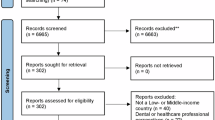Abstract
Objective
To assess the effectiveness of supervised toothbrushing programs in improving oral health outcomes among children and adolescents aged 3 to 18 years and to explore stakeholders’ perceptions in implementing and sustaining tooth brushing programs.
Methods
This mixed-method umbrella review followed JBI methodology and PRISMA guidelines. A systematic search was conducted across databases including MEDLINE, Cochrane, Scopus, Web of Science, CINAHL, Epistemonikos, ProQuest, and Google Scholar. A total of 159 articles were identified, and after screening, three systematic reviews met the inclusion criteria. The quantitative and qualitative findings were synthesized using a convergent segregated approach. The Theoretical Domains Framework (TDF) was applied to map barriers and facilitators influencing program adoption and sustainability.
Results
The quantitative synthesis included one systematic review with four included trials, two of which found statistically significant reductions in dental caries with supervised toothbrushing. The qualitative synthesis (two mixed-method systematic reviews) revealed key facilitators and barriers. The most prominent enablers and barriers identified across these reviews were knowledge about oral health/tooth brushing, social influences, and environmental context and resources. Specifically, the knowledge domain received 32 enabler responses and 25 barrier responses, underscoring the importance of understanding oral health practices to improve toothbrushing behavior. Social support garnered 35 enabler responses and 26 barrier responses, highlighting the role of a supportive environment in enhancing adherence to toothbrushing routines.
Conclusion
This review highlights the effectiveness of supervised toothbrushing programs in reducing dental caries. The qualitative synthesis, guided by the Theoretical Domains Framework (TDF), identifies key barriers and facilitators, including knowledge gaps, environmental constraints, social influences, and behavioural regulation factors.
This is a preview of subscription content, access via your institution
Access options
Subscribe to this journal
Receive 4 print issues and online access
$259.00 per year
only $64.75 per issue
Buy this article
- Purchase on SpringerLink
- Instant access to the full article PDF.
USD 39.95
Prices may be subject to local taxes which are calculated during checkout

Similar content being viewed by others
Data availability
All data supporting the conclusions of this study are available from the corresponding author from reasonable request.
References
Kassebaum NJ, Smith AGC, Bernabé E, Fleming TD, Reynolds AE, Vos T, et al. Global, regional, and national prevalence, incidence, and disability-adjusted life years for oral conditions for 195 countries, 1990-2015: a systematic analysis for the global burden of diseases, injuries, and risk factors. J Dent Res. 2017;96:380–7.
Kazeminia M, Abdi A, Shohaimi S, Jalali R, Vaisi-Raygani A, Salari N, et al. Dental caries in primary and permanent teeth in children’s worldwide, 1995 to 2019: a systematic review and meta-analysis. Head Face Med. 2020;16:22.
Oral Health | Healthy Schools | CDC [Internet]. 2023 [cited 2024 Feb 19]. Available from: https://www.cdc.gov/healthyschools/npao/oralhealth.htm.
Jackson SL, Vann WF, Kotch JB, Pahel BT, Lee JY. Impact of poor oral health on children’s school attendance and performance. Am J Public Health. 2011;101:1900–6.
Rebelo MAB, Rebelo Vieira JM, Pereira JV, Quadros LN, Vettore MV. Does oral health influence school performance and school attendance? A systematic review and meta-analysis. Int J Paed Dentistry. 2019;29:138–48.
Naavaal S, Kelekar U. School hours lost due to acute/unplanned dental care. Health Behav Policy Rev. 2018;5:66–73.
Jain N, Dutt U, Radenkov I, Jain S WHO’s global oral health status report 2022: Actions, discussion and implementation. Oral Dis. https://onlinelibrary.wiley.com/doi/abs/10.1111/odi.14516.
Cooper AM, O’Malley LA, Elison SN, Armstrong R, Burnside G, Adair P, et al. Primary school-based behavioural interventions for preventing caries. Cochrane Database Syst Rev. https://pubmed.ncbi.nlm.nih.gov/23728691/.
World Health Organization. Oral health promotion : an essential element of a health-promoting school. 2003 [cited 2025 Jul 21]; Available from: https://iris.who.int/handle/10665/70207.
Twetman S. Caries prevention with fluoride toothpaste in children: an update. Eur Arch Paediatr Dent. 2009;10:162–7.
Walsh T, Worthington HV, Glenny A, Marinho VC, Jeroncic A. Fluoride toothpastes of different concentrations for preventing dental caries. Cochrane Database Syst Rev. 2019;2019:CD007868.
Dos Santos APP, de Oliveira BH, Nadanovsky P. A systematic review of the effects of supervised toothbrushing on caries incidence in children and adolescents. Int J Paediatr Dent. 2018;28:3–11.
Dickson-Swift V. Supervised toothbrushing programs in primary schools and early childhood settings: A scoping review. Commun Dental Health. 2017;34:208–25.
Aromataris E, Fernandez R, Godfrey CM, Holly C, Khalil H, Tungpunkom P. Summarizing systematic reviews: methodological development, conduct and reporting of an umbrella review approach. JBI Evid Implementation. 2015;13:132.
Peres KG, Cascaes AM, Nascimento GG, Victora CG. Effect of breastfeeding on malocclusions: a systematic review and meta-analysis. Acta Paediatr. 2015;104:54–61.
Haddaway NR, Collins AM, Coughlin D, Kirk S. The role of google scholar in evidence reviews and its applicability to grey literature searching. PLoS One. 2015;10:e0138237.
Chandio N, Micheal S, Tadakmadla SK, Sohn W, Cartwright S, White R, et al. Barriers and enablers in the implementation and sustainability of toothbrushing programs in early childhood settings and primary schools: a systematic review. BMC Oral Health. 2022;22:242.
Aliakbari E, Gray-Burrows KA, Vinall-Collier KA, Edwebi S, Salaudeen A, Marshman Z, et al. Facilitators and barriers to home-based toothbrushing practices by parents of young children to reduce tooth decay: a systematic review. Clin Oral Investig. 2021;25:3383–93.
Al-Jundi SH, Hammad M, Alwaeli H. The efficacy of a school-based caries preventive program: a 4-year study. Int J Dent Hyg. 2006;4:30–4.
Pieper K, Winter J, Krutisch M, Völkner-Stetefeld P, Jablonski-Momeni A. Prevention in kindergartens with 500 ppm fluoride toothpaste-a randomized clinical trial. Clin Oral Investig. 2016;20:1159–64.
Hilgert LA, Leal SC, Mulder J, Creugers NHJ, Frencken JE. Caries-preventive effect of supervised toothbrushing and sealants. J Dent Res. 2015;94:1218–24.
Spears ND, Goldstein C, Gordinier N, Littman J. The effect of daily supervised deplaquing on dental caries in school children. A multiphasic study after 21 months. CDA J. 1978;6:36–42.
Crall JJ, Forrest CB. A Life Course Health Development Perspective on Oral Health. In: Halfon N, Forrest CB, Lerner RM, Faustman EM, editors. Handbook of Life Course Health Development. Cham (CH): Springer; 2018 [cited 2025 Feb 28]. Available from: http://www.ncbi.nlm.nih.gov/books/NBK543698/.
Nassar Y, Brizuela M. The Role of Fluoride on Caries Prevention. In: StatPearls [Internet]. Treasure Island (FL): StatPearls Publishing; 2025. http://www.ncbi.nlm.nih.gov/books/NBK587342/.
Green CA, Duan N, Gibbons RD, Hoagwood KE, Palinkas LA, Wisdom JP. Approaches to mixed methods dissemination and implementation research: methods, strengths, caveats, and opportunities. Adm Policy Ment Health. 2015;42:508–23.
Atkins L, Francis J, Islam R, O’Connor D, Patey A, Ivers N, et al. A guide to using the Theoretical Domains Framework of behaviour change to investigate implementation problems. Implement Sci. 2017;12:77.
Bonetti D, Johnston M, Pitts NB, Deery C, Ricketts I, Tilley C, et al. Knowledge may not be the best target for strategies to influence evidence-based practice: using psychological models to understand RCT effects. IntJ Behav Med. 2009;16:287–93.
Thompson W, Tonkin-Crine S, Pavitt SH, McEachan RRC, Douglas GVA, Aggarwal VR, et al. Factors associated with antibiotic prescribing for adults with acute conditions: an umbrella review across primary care and a systematic review focusing on primary dental care. J Antimicrob Chemother. 2019;74:2139–52.
Akpabio A, Klausner CP, Inglehart MR. Mothers’/guardians’ knowledge about promoting children’s oral health. J Dent Hyg. 2008;82:12.
Castilho de ARF, Mialhe FL, Barbosa de ST, Puppin-Rontani RM. Influence of family environment on children’s oral health: a systematic review. J Pediatr (Rio J). 2013;89:116–23.
Amin MS, Harrison RL. Understanding parents’ oral health behaviors for their young children. Qual Health Res. 2009;19:116–27.
Baginska J, Rodakowska E. Knowledge and practice of caries prevention in mothers from Bialystok, Poland. 2012;4.
Pine CM, McGoldrick PM, Burnside G, Curnow MM, Chesters RK, Nicholson J, et al. An intervention programme to establish regular toothbrushing: understanding parents’ beliefs and motivating children. Int Dent J. 2000;Suppl Creating A Successful:312–23.
Eley C, Weston-Price S, Young V, Hoekstra B, Gadhia T, Muirhead V, et al. Using oral hygiene education in schools to tackle child tooth decay: a mixed methods study with children and teachers in England. J Biolog Educ. 2020;54:381–95.
Funding
The author(s) didn’t receive grants from any funding agency in the public, commercial or not for profit sectors.
Author information
Authors and Affiliations
Contributions
C.J conceived the study. V.S.V conducted the literature search. C.J and A.J conducted the review, data extraction, coding, interpreted the data and wrote the first draft of the manuscript. N.M and M.A conducted quality assessment and revised the work critically for important intellectual content. All authors have contributed to the design, revisions, and approved the final manuscript.
Corresponding author
Ethics declarations
Competing interests
The authors declare no competing interests.
Ethics
The review complies with international ethical standards in reviewing research studies.
Additional information
Publisher’s note Springer Nature remains neutral with regard to jurisdictional claims in published maps and institutional affiliations.
Supplementary information
Rights and permissions
Springer Nature or its licensor (e.g. a society or other partner) holds exclusive rights to this article under a publishing agreement with the author(s) or other rightsholder(s); author self-archiving of the accepted manuscript version of this article is solely governed by the terms of such publishing agreement and applicable law.
About this article
Cite this article
Janakiram, C., James, A., Vattiprolu, S.V. et al. Supervised toothbrushing programs: evaluating impact, barriers, and facilitators – a mixed-method umbrella review. Evid Based Dent 26, 176–177 (2025). https://doi.org/10.1038/s41432-025-01178-9
Received:
Accepted:
Published:
Version of record:
Issue date:
DOI: https://doi.org/10.1038/s41432-025-01178-9



